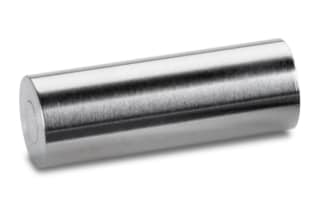
|
Chemistry |
C18 |
|
Separation Mode |
Reversed Phase |
|
Particle Substrate |
Silica |
|
pH Range Min |
2 pH |
|
pH Range Max |
8 pH |
|
Maximum Pressure |
6000 psi (415 Bar) |
|
Endcapped |
Yes |
|
Silanol Activity |
Low |
|
Particle Shape |
Spherical |
|
Particle Size |
5 µm |
|
Pore Size |
100 Å |
|
Format |
Sentry Guard Cartridge |
|
Surface Area |
340 |
|
System |
HPLC |
|
USP Classification |
L1 |
|
Inner Diameter |
4.6 mm |
|
Length |
20 mm |
|
Carbon Load |
16 % |
|
UNSPSC |
41115709 |
|
Brand |
SunFire |
|
Product Type |
Guards |
|
Units per Package |
2 pk |

SunFire C18 Sentry Guard Cartridge, 100Å, 5 µm, 4.6 mm X 20 mm, 2/pk
The guard cartridge is a type of protective lab equipment that is installed between the injector and the analytical column in your system. It will provide an extended lifetime of your SunFire C18 Columns by removing the chemical impurities and suspended solids from reaching the analytical column. Additionally, it will help maintain their UPLC, UHPLC, and HPLC separation efficiency.
The SunFire C18 Sentry Guard Cartridge has been designed and developed especially for situations where increased capacity for biological fluid cleanup and/or temperature control is required. All SunFire Columns and Guard Cartridges are known for their excellent low-pH stability, high chromatographic efficiency, and superior peak shapes for charged analyte species.
The SunFire C18 Sentry Guard Cartridge is manufactured using the identical packing materials that are used in the SunFire C18 Columns, making them ideally suited for the analytical columns and ensuring that the columns continue to perform at their optimum level. The Guard Column is easy to install and enhances the analytical performance of your analytical column by preventing any chemical and particulate impurities from entering the mobile phase stream.
Like all Waters equipment, the SunFire C18 Sentry Guard Cartridge is manufactured in a cGMP, ISO 9001 certified plant using ultra-pure reagents. In addition to this, each batch of the SunFire C18 Sentry Guard Cartridge packing material is tested chromatographically with acidic, basic, and neutral analytes. The results are held to the highest standards and the narrowest specification ranges to assure excellent, reproducible performance every single time for you.
Find various products that are compatible with the SunFire C18 Sentry Guard Cartridge, including guards, vials, elution plates, from our website. The website enables you to shop for lab equipment, and explore our wide selection of products.
You may also want to look into our Reversed-Phase QC Reference Material; it is a unique collection of standards and mixtures. Specifically designed to provide this complexity and is appropriate when complex assays are routinely performed. It can be used with a variety of column chemistries, dimensions, and system hardware. It contains 7 compounds, including uracil, butylparaben, naphthalene, propranolol, dipropyl-phthalate, acenaphthene, and amitriptyline at pH 7.
What Are The Pressure And pH Limitations For SunFire C18 Sentry Guard Cartridge?
The SunFire C18 Sentry Guard Cartridge can operate easily between an extensive pH range of 2 to 8, and up to a maximum of 600psi (or 415 Bar) pressure. You should note that working at the extremes of pressures, pH, and/or temperatures will result in shorter column lifetimes.